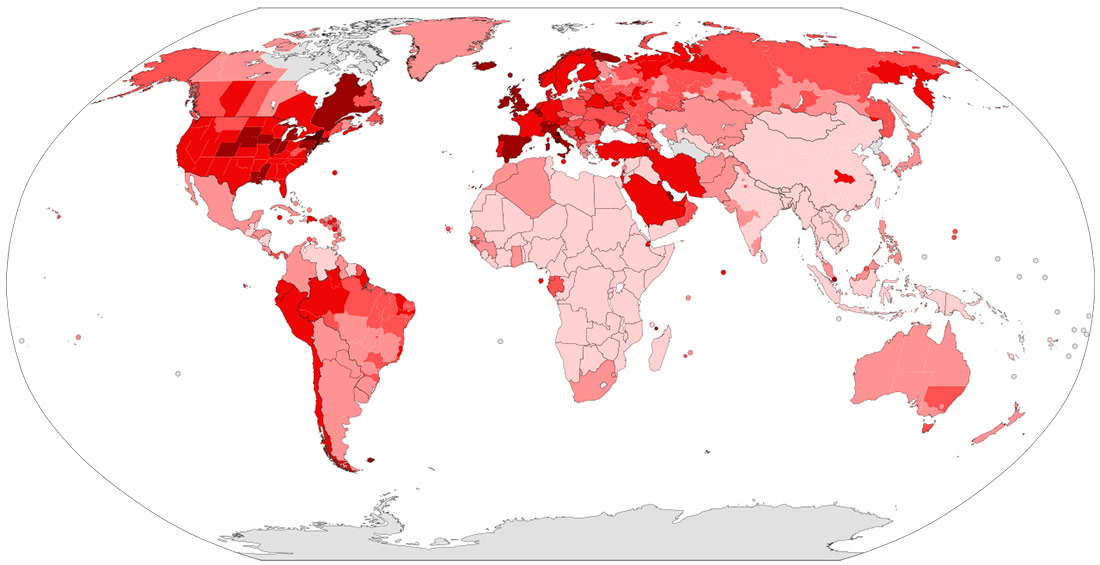
Clerks working with masks on during the 1918 flu pandemic. New York City, 1918 | U.S. National Archives and Records Administration | Public Domain
Most intellectual efforts surrounding the coronavirus seek to comprehend, manipulate and even eradicate the disease. Other narrative accounts, in a more reflexive way, examine the critical impact COVID-19 has had on human day-to-day life. This short essay, conversely, attempts to explain the virus’s story. In doing so, the distinction between human and virus becomes rather intricate and more intimate than expected. This revealing beyond-the-human entanglement calls into question the anthropocentric character of modernity and retrieves an appropriate sense of modesty to reimagine liveable, durable worldly alliances.
In a recent short and rather provocative digital essay, culture and media theorist McKenzie Wark sorrowfully expresses that most pronouncements on the coronavirus “seem to take the form of attempts to demonstrate why the pandemic proves them right”. Amid the current viral intellectual storm, she continues: “Good theory doesn’t try to be sovereign over other kinds of knowledge.” Unwilling to add to this bulk of writing, albeit a contradiction in terms, the following lines propose a reconsideration of the knowledge being produced by the disease and suggest an exercise in storytelling not about the virus, but with it. In this effort of cognitive empathy, the limits between human and virus seem to blur, and the dream of modernity, founded on the human-nature separation, dolefully fades away.
Over the last few weeks, friends, colleagues and countless experts have painstakingly sought to extract innovative and resolutive knowledge from the all-encompassing coronavirus episode. The majority, somewhat positivistic and scientific in approach, explore formulas to mitigate the dreadful health consequences, reverse the deteriorating course of events and ultimately produce a preventive drug. Others, more critically, reflect on the different ways in which the pandemic has affected the human condition, described for example by the emerging concept of the “politics of withdrawal” in reference to the worldwide lockdown and retreat in which societies are forcefully trapped.
Increasingly, these opportunistic, rushed, anxious, even hysterical endeavours to produce knowledge, triggered by the outbreak of the disease, seem to be reproducing an epistemological colonisation. In short, this is the lack of neutrality, generosity and solidarity of a large part of human-led forms of knowledge production. Nowadays it is fashionable in academia to use life experiences of indigenous populations to produce journal articles and books that address the challenges of the Anthropocene—the current geological epoch characterised by the visibility of the human imprint on ecosystems. These cutting-edge discourses ostensibly present themselves as emancipatory or at least supportive of the indigenous cause. However, hardly anyone in universities campaigns in a meaningful way for practices of reparation, probably the only honest way for former empires to pay their debt, even if it means leaving the land they stole. Dig a little deeper and most of these scholarly conversations mask—maybe unconsciously, maybe not—an attempt to secure the predominance of white, elitist, Anglo-American debates.
Similarly, most accounts of COVID-19 are producing a kind of knowledge that is rooted in a human-centred, self-seeking, careless interpretation of this more-than-human entanglement. Constantly outlining the human suffering of this regrettable episode is a partial report. What’s more, it is an unfair viewpoint in the context of the overall non-human history of the world, which involves the obliteration of entire landscapes, water resources and living species. A legitimate question might be: Why should the human produce knowledge sensitive to the non-human? Or, why is the epistemological colonisation of the non-human problematic?
There is a tentative answer to these questions. Throughout the last three centuries, the acceleration of the rational conquest of non-human nature, mostly by scientific means, has materialised in the two political projects underpinning enlightened modernity: liberalism and capitalism. Whereas the former deprives the non-human of natural rights (e.g. the right to life), the latter feeds on the extraction, manipulation and exploitation of the non-human (e.g. the oil industry). The everyday violence resulting from liberalism and capitalism, suffered not only by the non-human but by a vast majority of human societies (e.g. wars, rampant poverty), is, then, inextricable from hubristic desires for human mastery of the planet. A more appealing set of questions might be: Who gets to choose the events that go to produce knowledge? Who gets to produce that knowledge? Who gets to write it and speak it? Who gets read and heard? It is hard to overlook the fact that relations between human and non-human ecologies are bound with the implications of the power-knowledge undertaking.
Can we produce knowledge in a different way? Perhaps in a more careful, modest manner? Can we think with rather than about the virus? On the basis of Eduardo Viveiros de Castro’s concept of “perspectivism”, coined to encapsulate the anthropologist’s critical engagement with Amerindian reality, with reference to Deleuze, perspectiveness is defined as the capacity to occupy a point of view. Unlike representations, which are properties of the mind, to him a point of view is in the body. Western epistemology seeks to desubjectify the world and turn it into observable objects. In modernity, what is not objectified is unreal. Viveiros de Castro, conversely, proposes sensitising or even personifying the point of view of what should be known. The question here is not to romanticise the agency of the virus, but to debunk the colonising unidirectionality of anthropocentric forms of knowledge production. Eloquently, Viveiros de Castro states: “All beings see the world in the same way; what changes is the world they see. Animals rely on the same ‘categories’ and ‘values’ as humans […]. But the things they see when they see them like we do are different: what we take for blood, jaguars see as beer.” Using an analogous figure, cultural researcher Elisabet Roselló argues in a previous article in this digital magazine that “without losing sight of the fact that we think from ourselves, and cannot experience what it is to be a plant or ‘to be an app’, at most we can imagine it”. However, the coronavirus, like everything non-human, has its own story to tell—a story that humans are inattentive to or, simply, unwilling to listen to.
In this perspectivist context, looking beyond human-centric narratives, we might see how COVID-19 has successfully colonised space and time on earth, at least temporarily. The human is taking its own medicine. The fiction of limitless and teleological human progress has been abruptly interrupted. While to most commentators the disease is an embodied externality breaking out in an indeterminate Euclidean coordinate and tragically encountering the human, the course of events is simply staging a play in which human and non-human ecologies seem to be entwined in tense, unpredictable negotiations. What’s more, as the changes in routine (e.g. confinement) that we are experiencing indicate, the human form of being in the present world is constituted by the uncertain outcomes of this beyond-the-human entanglement. Likewise, the very existence of the virus hinges on this relation, particularly on the extent to which the human will be successful in achieving its eradication.

COVID-19 outbreak world map per capita (12 May 2020) | Raphaël Dunant, Gajmar and Pharexia, Wikipedia | CC BY
In other words, human and coronavirus are constantly reinventing each other in power relations. This is not a postmodern or metaphorical claim, it is a bio-material affirmation: in our body, the virus transforms our metabolism by means of microchemical processes, and the future mutations of the virus depend on its assemblage with the human and its surroundings. Accordingly, the virus-human ontological boundary is compromised, making it more and more difficult to comprehend the two beings separately. Ultimately, there is little difference between the virus and the human when it comes to their form of being on the planet: a colonising attempt hindered by a mutually constitutive negotiation.
Endorsing this withinness of the world, as physicist Karen Barad refers to it, might unleash a sense of modesty that opens up the possibility of speculating differently about liveable amalgamations on earth. Far from the unidirectionality of epistemological colonisation and its liberal and capitalist implications, embracing beyond-the-human negotiations requires us to abandon the anthropocentric dream of modernity. Accordingly, thinking with COVID-19 requires us to eschew scientific and rational forms of knowledge production in order to explore non-modern methods of mediating and imagining reality. The creative force of art could shed light here. French philosopher Gilbert Simondon explained how the arts can reconstitute the universe by recovering other possible realities. By means of the arts, we can imagine and create countless other worlds, which are not necessarily deterministic, rational and projected on a human-centred horizon. Furthermore, through the arts, rather than science, the human can get closer to what forest, air and sea feel. The sublime behind certain artistic interventions might indeed enable us to embody and sensitise with others’ cosmovision and points of view. From William S. Burroughs to Ursula K. Le Guin, the aesthetic possibilities for non-modern forms of life- and world-making are infinite.
The virus has very clearly shown that the world is not the world anymore—at least, not as the humans of modernity had thought of it. What is the world then? Vagueness about the world to come should not necessarily be a source of concern, since the precision of enlightened rationality and its rigid categories (e.g. civilisation, race, nation, gender) have mostly unleashed pain and grief. The project of modernity has to date been masterfully secured by state apparatus, economic forces, mass media and the fantasy of a middle class, yet a worldwide spread of micro-organic material has now unexpectedly exposed this delusion in its entirety. It seems like a good time to slow down the pace, return to modesty, unleash creativity and reimagine responsible and durable beyond-the-human alliances.




Xus de Miguel Vallejo | 01 June 2020
Brillant! Lúcid! Una invitació, radicalment nova, de pensar el món, de pensar-nos. M’ha encantat! Ara, es tracta de fer d’aquestes reflexions el punt de partença d’imagnaris nous, de noves maneres d’actuar, de relacionar-nos amb el món, el viu i el que anomenem “no viu”.
Gràcies, Ignasi!
Leave a comment